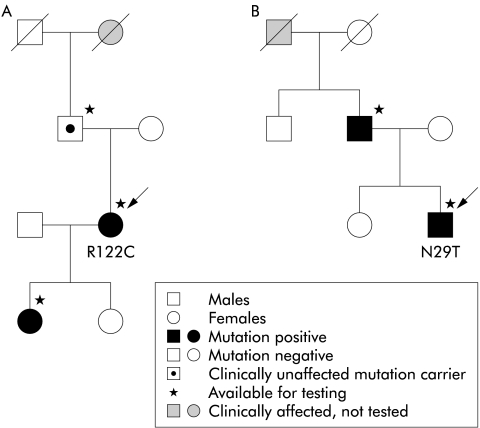Abstract
Hereditary pancreatitis (HP) is usually caused by mutations in the cationic trypsinogen (PRSS1) gene, especially R122H or N29I. We sequenced the PRSS1 gene in the proband of families without these common mutations. Novel R122C and N29T mutations were detected in independent families that segregated with the disease in an autosomal dominant fashion. The R122C mutation eliminates the arginine autolysis site as with R122H mutations. The N29T mutation may also enhance intrapancreatic trypsin activity as has been demonstrated in vitro. Identification of these new mutations requires special attention as commonly used detection methods may fail.
Keywords: N29T mutations, R122C mutations, pancreatitis
Hereditary pancreatitis (HP) is an autosomal dominant disorder with high penetrance characterised by multiple episodes of acute pancreatitis, development of chronic pancreatitis, and high incidence of pancreatic cancer.1,2 About 60% of cases are caused by PRSS1, R122H, and N29I mutations.3,4 Other PRSS1 mutations (A16V, D22G, K23R, and −28delTCC) are rare. Herein we report two novel mutations of PRSS1 causing the typical HP phenotype.
MATERIALS AND METHODS
Recruitment, consent, counselling, DNA extraction, and exon specific sequencing were performed as previously described.3,5 The proband of each HP kindred (n=209) was sequentially analysed by AflIII restriction endonuclease digestion of PRSS1 exon 33 then, if negative, exon 2 sequencing, and then, if negative, DNA sequencing of exons 1, 3, 4, and 5.
RFLP analysis
A novel codon 29 restriction fragment length polymorphism (RFLP) analysis was performed using Bst4CI (SibEnzyme Ltd, Novosibirsk-117, 630117, Russia). The wild-type polymerase chain reaction (PCR) product has three recognition sites for Bst4CI, with four digestion products of 415, 160, 151, and 79 bp. A mutation at position 131945 causes loss of one ACNGT recognition site so that a mutant allele has three digestion products of 415, 230, and 151 bp. Restriction endonuclease digestion was performed using 5 μl of PCR product, 3 units of Bst4CI, 0.2 μl of bovine serum albumin, and 2 μl of Bst4CI buffer in a 20 μl reaction. Digestion was performed at 65°C for two hours. Fragments were separated on a 10% polyacrylamide gel.
RESULTS
Pedigree No 1
The 25 year old index patient, with symptoms from age five years, was diagnosed with pancreatitis at age 18 years (fig 1A ▶). Her paternal grandmother (deceased) was diagnosed with chronic pancreatitis at age 34 years and one of her two daughters had pancreatitis at age five years. A C to T transition mutation at position 133282 (Genbank accession U66061) resulted in a R122C amino acid substitution. This mutation was detected in the father and symptomatic daughter but not in 58 PRSS1 R122H/N29I mutation negative HP patients, 66 patients with familial or idiopathic pancreatitis, or 130 healthy controls. The AflIII digestion failed to detect the novel R122C mutation.
Figure 1.
Pedigrees demonstrating an autosomal dominant inheritance pattern of pancreatitis. (A) Pedigree of the family with a R122C mutation. The arrow points to the index case. (B) Pedigree of the family with a N29T mutation. The arrow points to the index case.
Pedigree No 2
The 23 year old proband, his father, and grandfather all had symptoms of pancreatitis (fig 1B ▶). An A to C transition mutation at position 131945 (Genbank accession U66061) resulted in a N29T amino acid substitution. This mutation was present in the affected father but not other groups, as described above. Bst4CI digest detected the N29T mutation.
DISCUSSION
Two novel mutations alter the “hot spot” codons 29 and 122 where previously gain of function mutations associated with an autosomal dominant inheritance pattern were found. Sahin-Toth has recently expressed mutants in human cationic trypsin at codon 29 (that is, N29I and N29T) and completed in vitro studies comparing them with wild-type human cationic trypsinogen.6 In vitro, the N29T mutation markedly enhanced autoactivation and also decreased autolysis.6 The R122 site is critical for initiating autolysis in humans, and any amino acid substitution (R122H or R122C) would eliminate that site. Finally, RFLP analysis and similar mutation specific screening strategies may miss important mutations that clearly predispose some individuals to pancreatitis.
Supplementary Material
Acknowledgments
This research was supported by the following grants: NIH DK54709 (DCW), NIH AA10855 (DCW), VA Merit Review (DCW), Center for Genomic Sciences at the University of Pittsburgh, and a scholarship from the University of Heidelberg (RHP). EUROPAC is supported by the North WestCancer Research Fund, UK. Technical assistance was provided by Lara Chensny and Paul Wood. We also wish to thank all members of the MMPSG and EUROPAC.
This paper was presented at the Digestive Disease Week, Atlanta, Georgia, USA, May 21 2001 (Gastroenterology 2001;120:A33).
Abbreviations
HP, hereditary pancreatitis
RFLP, restriction fragment length polymorphism
PCR, polymerase chain reaction
REFERENCES
- 1.Lowenfels A, Maisonneuve P, DiMagno E, et al. Hereditary pancreatitis and the risk of pancreatic cancer. J Natl Cancer Inst 1997;89:442–6. [DOI] [PubMed] [Google Scholar]
- 2.Perrault J. Hereditary pancreatitis. Gastroenterol Clin North Am 1994;23:743–52. [PubMed] [Google Scholar]
- 3.Whitcomb DC, Gorry MC, Preston RA, et al. Hereditary pancreatitis is caused by a mutation in the cationic trypsinogen gene. Nat Genet 1996;14:141–5. [DOI] [PubMed] [Google Scholar]
- 4.Gorry MC, Gabbaizedeh D, Furey W, et al. Mutations in the cationic trypsinogen gene are associated with recurrent acute and chronic pancreatitis. Gastroenterology 1997;113:1063–8. [DOI] [PubMed] [Google Scholar]
- 5.Applebaum SE, Kant JA, Whitcomb DC, et al. Genetic testing: counseling, laboratory and regulatory issues and the EUROPAC protocol for ethical research in multi-center studies of inherited pancreatic diseases. Med Clin North Am 2000;82:577–88. [DOI] [PubMed] [Google Scholar]
- 6.Sahin-Toth M. Human cationic trypsinogen. Role of Asn-21 in zymogen activation and implications in hereditary pancreatitis. J Biol Chem 2000;275:22750–5. [DOI] [PubMed] [Google Scholar]
Associated Data
This section collects any data citations, data availability statements, or supplementary materials included in this article.



